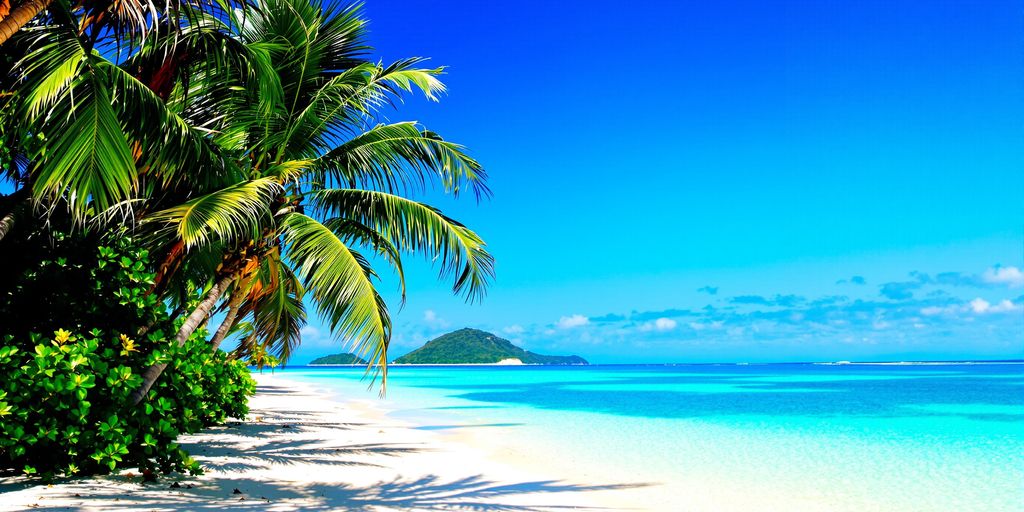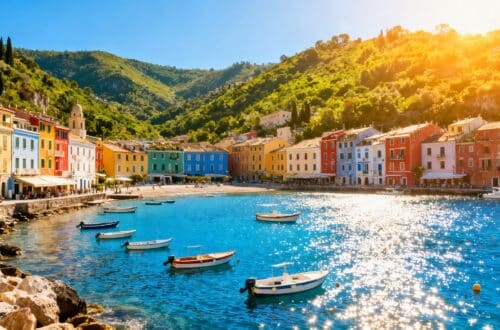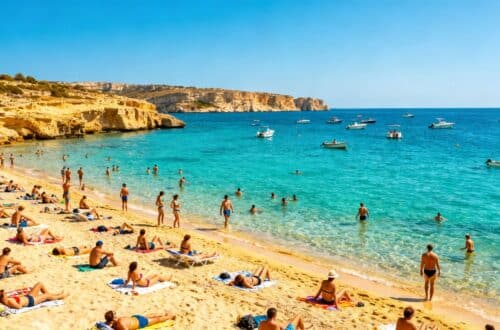Thinking about packing your bags and heading to a Caribbean island? It’s a dream for many, and honestly, it’s not as far-fetched as you might think. The Caribbean offers a bunch of different places to live, each with its own vibe. Whether you’re looking for a quiet spot to retire, a place with good job opportunities, or just a change of scenery, there’s likely an island that fits. We’ve put together a guide to help you figure out the best Caribbean island to live on, looking at what makes each one special for expats.
Key Takeaways
- The cost of living varies significantly across Caribbean islands, with some being more affordable than others.
- Several islands offer tax benefits and citizenship by investment programs, making them attractive for expats.
- When choosing the best Caribbean island to live on, consider factors like lifestyle, job opportunities, safety, and healthcare.
1. Jamaica
Jamaica, the "Land of Wood and Water," is a vibrant Caribbean island that offers a unique blend of culture, natural beauty, and a relaxed pace of life. It’s a place where reggae music fills the air, the beaches are stunning, and the people are known for their warmth and hospitality. For expats looking for an island experience with a strong sense of community and plenty of activities, Jamaica is definitely worth considering. The cost of living can be quite reasonable, especially if you venture outside the main tourist hubs. You’ll find that everyday expenses, from groceries to local transportation, are generally affordable.
When thinking about settling down here, consider these points:
- Diverse Landscapes: From the famous white-sand beaches of Negril to the lush Blue Mountains, Jamaica offers a variety of scenery. You can find coastal living or a cooler climate in the hills.
- Rich Culture: Immerse yourself in the birthplace of reggae, explore historical sites, and enjoy the local cuisine. Jamaican food is a highlight, with jerk chicken and fresh seafood being popular choices.
- Community Feel: Many expats find that Jamaicans are very welcoming. Building connections can be a rewarding part of the experience.
- Activities Galore: Whether you enjoy hiking, water sports, exploring waterfalls, or simply relaxing on the beach, there’s always something to do.
While Jamaica has a lot to offer, like any move, it requires some adjustment. Understanding local customs and being open to new experiences will make your transition smoother. It’s a place that rewards those who embrace its spirit.
Getting around the island is relatively easy, with options like route taxis and minibuses being very common and budget-friendly for daily commutes. For longer distances or more comfort, private taxis and car rentals are available. If you’re planning to explore more of the Caribbean, you might find affordable travel options helpful for your budget.
2. Dominican Republic
When you think about island living, the Dominican Republic often pops up, and for good reason. It’s a place where you can really get a feel for the Caribbean vibe without breaking the bank. Many expats find the cost of living here to be quite manageable, especially when you compare it to places back home or even some of its island neighbors. You can get by comfortably on a modest budget, leaving room for enjoying the beaches and local culture.
Getting settled in can be pretty straightforward. There are established expat communities in various parts of the country, which can make the transition smoother. Whether you’re looking for a lively social scene or a more laid-back existence, you’ll likely find a spot that fits. Plus, the country has a lot to offer in terms of natural beauty, from mountains to stunning coastlines.
Here’s a quick look at what you might expect for monthly expenses:
| Category | Estimated Cost (USD) |
|---|---|
| Rent (1-bedroom) | $400 – $700 |
| Utilities | $100 – $150 |
| Groceries | $250 – $400 |
| Transportation | $50 – $100 |
| Entertainment | $100 – $200 |
Keep in mind these are just estimates, and your actual spending will depend a lot on your personal choices and where you decide to live. For instance, living in a popular tourist area like Punta Cana will likely cost more than settling in a less-developed region. You can find more details on the cost of living in places like Puerto Plata.
The Dominican Republic offers a blend of affordability and vibrant island life that appeals to many looking for a change of pace. It’s a place where you can immerse yourself in a rich culture and enjoy the tropical climate without the high price tag often associated with Caribbean living.
If you’re considering making the move, it’s worth looking into the different regions. Some areas are more developed with better infrastructure, while others offer a more rustic, authentic experience. The Dominican Republic makes island living accessible.
3. Antigua and Barbuda
Antigua and Barbuda is a pretty sweet spot if you’re thinking about moving to the Caribbean. Seriously, they have 365 beaches – that’s one for every single day of the year. Imagine that! The water is super clear, and there’s tons of marine life, so if you like swimming, snorkeling, or just lounging by the sea, this place is great.
It’s also known for being one of the safer islands in the region, which is a big plus. While the cost of living might be a little higher than some other islands, people say the quality of life makes up for it. Renting a one-bedroom place outside the main city areas goes for about $740 a month, which isn’t too bad. If you’re looking to buy property, you can actually get citizenship through an investment of $325,000, which is pretty interesting if you’re thinking long-term.
The islands have a strong focus on keeping things green and protecting the environment. This means they’re trying to keep the natural beauty around for a long time, which is nice if you care about that sort of thing.
Getting around is also fairly easy, with direct flights to places like the US and Europe. It feels like a good mix of beautiful nature, a decent cost of living, and a relaxed pace of life. Plus, the government is pushing for eco-friendly practices, which is a good sign for the future.
4. Cayman Islands

If you’re looking for a place that blends financial stability with a seriously upscale island lifestyle, the Cayman Islands might be your spot. This British Overseas Territory is often called the "Gold Standard for Offshore Finance," and for good reason. It’s a major financial hub, attracting a lot of wealthy individuals and businesses because there are no direct taxes on income, capital gains, or inheritance. So, if minimizing your tax burden while living in paradise is a priority, this is definitely worth a look.
Life here is pretty polished. You’ll find top-notch healthcare, excellent international schools, and plenty of luxury amenities. It’s a place that really caters to those who appreciate the finer things. However, you should know that the cost of living is on the higher side compared to many other Caribbean islands. Grand Cayman, the most developed island, is particularly pricey when it comes to real estate. If you’re thinking about getting a residency visa through investment, the price tag starts at $1.2 million, with a required annual foreign-earned income of at least $150,000.
Here’s a quick look at some investment requirements for residency:
- Residency by Investment: Invest a minimum of $1.2 million (or $2.4 million for a faster process) in local real estate or businesses to gain permanent residency.
- High Quality of Life: Expect excellent infrastructure, a safe environment, and a strong sense of community among expats.
- Financial Advantages: Enjoy a tax-neutral environment, which is a big draw for many.
The Cayman Islands offer a unique combination of financial advantages and a luxurious island lifestyle. It’s a well-governed and politically stable environment, making it a secure choice for those seeking a high standard of living. The focus on financial services means there’s a sophisticated infrastructure to support both businesses and residents.
For those considering property ownership as a path to residency, exploring options for buying property in the Caribbean can be a good starting point. The Cayman Islands are a prime example of how financial benefits and a beautiful setting can come together for expatriates.
5. Barbados
Barbados is often called the most developed island in the Caribbean, and for good reason. It’s a place that really seems to have its act together, with a government that actually seems to care about its people. You can’t really own a private beach here, which sounds like a bummer, but it actually means everyone gets to enjoy the whole coastline. Pretty neat, right?
For folks working online, Barbados has a special visa, which is a nice touch. Plus, getting there is pretty easy, with direct flights from the US and Europe. It’s a popular spot for Canadians too, thanks to a tax treaty they’ve had for ages. This has made it a bit of a hub for business, all while being in a tropical paradise. The island itself is beautiful, with great beaches and a lively culture. People are generally friendly, and you can find everything from busy city life in Bridgetown to quiet spots on the Platinum Coast. They also seem to have good schools and hospitals, which is a big plus.
While Barbados is a top-tier destination, be prepared for a higher cost of living, especially if you’re looking at the fancy Platinum Coast. It’s definitely a trade-off for the quality of life and amenities you get.
Here’s a quick look at some key aspects:
- Developed Infrastructure: Well-maintained roads and reliable utilities.
- Healthcare: A good public system supplemented by private options.
- Connectivity: Excellent flight connections to major international hubs.
- Safety: Known for low crime rates and a stable political environment.
6. St Kitts and Nevis
St. Kitts and Nevis, a two-island nation, really offers a unique Caribbean experience. It’s known for its dramatic, cloud-covered mountains and those picture-perfect beaches you see in magazines. Many people find the vibe here to be really welcoming and laid-back, which is a big draw for expats. The government has put a good amount of effort into tourism and building up the infrastructure, which has helped create a stable and secure place to live. Plus, the crime rates are generally low, and there’s a strong sense of community, which adds to the feeling of safety.
The tax situation is a major plus for anyone considering a move here. St. Kitts doesn’t have income tax, capital gains tax, or inheritance tax. So, you won’t have to worry about taxes on money you earn anywhere in the world. This alone makes it a really attractive spot for retirees and investors.
Here’s a quick look at some of the costs you might encounter:
| Expense Category | Estimated Monthly Cost (USD) |
|---|---|
| Basic Utilities (Elec, Water, Gas, Trash) | $150 – $250 |
| Internet | $60 – $100 |
| Groceries | $400 – $600 |
| Transportation (Local) | $50 – $100 |
| Total (excluding rent) | $660 – $1050 |
If you’re looking for a way to make relocating even smoother, the St. Kitts and Nevis Citizenship by Investment program is worth checking out. It’s one of the older and more respected programs of its kind in the Caribbean. It gives you a few options, like investing in real estate or making a donation, and in return, you can get citizenship. This often comes with the perk of visa-free travel to over 150 countries, which is pretty handy.
The blend of natural beauty, a favorable tax environment, and programs designed to ease the transition for new residents makes St. Kitts and Nevis a compelling choice for those seeking a new home in the Caribbean.
7. Turks and Caicos

Turks and Caicos really is something else if you’re looking for that upscale Caribbean vibe. Think pristine white sand beaches, especially Grace Bay, which people rave about constantly. It’s a British Overseas Territory, and it definitely leans into a luxurious, yet laid-back, kind of living. The real estate market here is pretty active, with options from beachfront homes to fancy condos, and many see it as a solid investment because the islands are getting more popular and the economy seems stable.
One of the biggest draws for many expats is the tax situation. There’s no income tax, no capital gains tax, and no inheritance tax. This makes it a really attractive spot if you’re trying to manage your finances carefully.
However, you’re going to pay for that luxury and tax advantage. The cost of living is quite high, probably one of the highest you’ll find in the Caribbean. A lot of things are imported, which drives up prices. While the healthcare facilities are modern, if you have a serious medical issue, you might need to go to the US for treatment, so good health insurance is a must.
Getting there is pretty easy, though. There are direct flights from several major cities in North America, making it fairly convenient for those who travel often.
The lifestyle here is all about refined elegance and top-notch amenities. You’ve got luxury resorts, private villas, great dining, and exclusive clubs. It’s designed for people who appreciate the finer things and want a comfortable life with modern conveniences like good healthcare and international schools.
If you’re considering a move, it’s worth looking into the specifics of residency and costs to see if it fits your budget. You can find essential information for digital nomads considering a move to the Turks and Caicos Islands here.
8. Curaçao
Curaçao, a Dutch Caribbean island, offers a unique blend of European charm and tropical allure. It’s known for its colorful architecture, particularly in the capital city of Willemstad, which is a UNESCO World Heritage site. For those looking to establish residency, Curaçao has a program that can lead to EU citizenship after five years, which is quite a draw for many expats. The island generally enjoys a stable climate and is considered a safe destination within the Caribbean region.
When it comes to settling down, Curaçao presents a few options:
- Home Visa Program: This is great for digital nomads, allowing remote work for six months with an extension possibility. It also comes with tax benefits common in Caribbean tax havens.
- Investor Permit Program: This program is a bit more involved, potentially offering dual residency in the Netherlands and the Caribbean, with a path to EU citizenship after five years. It’s a solid route if you’re thinking long-term about European ties.
- Retirement Residency: For retirees, purchasing property valued at a minimum of $280,000 can secure a permanent residency permit. The island’s relaxed vibe and beautiful beaches make it an appealing spot for a quieter life.
The cost of living can vary, but generally, it’s comparable to many Western European countries, especially when considering the quality of life and the unique environment. Groceries might be a bit pricier due to import costs, but local produce is available.
Getting around is fairly easy, with a car being the most practical option for exploring the island’s diverse landscapes and hidden coves. Public transport exists but isn’t always the most convenient for reaching all the spots an expat might want to visit. Overall, Curaçao provides a distinct Caribbean experience with a strong European influence, making it a compelling choice for those seeking a different pace of life.
9. Saba
Saba, often called the "Unspoiled Queen" of the Caribbean, is a tiny Dutch Caribbean island that packs a serious punch for those seeking tranquility and natural beauty. It’s not your typical sprawling resort island; instead, Saba offers a unique, intimate experience. This island is a diver’s paradise, boasting some of the most pristine marine environments in the region. If you’re looking for a place where nature takes center stage and the pace of life is refreshingly slow, Saba might just be your spot.
Getting to Saba involves a bit of an adventure itself, usually a short flight from St. Maarten. Once you arrive, you’ll find a place that’s incredibly green, with dramatic volcanic landscapes and charming villages clinging to the hillsides. Life here is about appreciating the simple things: stunning views, fresh air, and a strong sense of community. It’s a place where you can truly disconnect from the hustle and bustle.
Here’s a quick look at what makes Saba stand out:
- Incredible Scenery: The entire island is essentially the peak of a dormant volcano, offering breathtaking panoramic views.
- World-Class Diving: Saba Marine Park is a protected area with vibrant coral reefs and abundant marine life, making it a top destination for experienced divers.
- Hiking Trails: Despite its small size, Saba has well-maintained hiking trails that lead you through lush rainforests to stunning viewpoints.
- Quiet Lifestyle: Forget crowded beaches and noisy nightlife. Saba is all about peace and quiet, perfect for those who value serenity.
While Saba offers an unparalleled natural experience, it’s important to note that its small size means amenities are limited. You won’t find large supermarkets or a wide variety of restaurants, but the local establishments are charming and offer a taste of island life. Planning your shopping and dining is part of the Saba experience.
For those considering a move, understanding the cost of living is key. While exact figures can fluctuate, expect costs to be comparable to other smaller, more remote Caribbean islands. You’ll find that imported goods can be pricier, but local produce is often available. If you’re looking for affordable travel destinations, Saba might not be the first place that comes to mind, but its unique appeal is undeniable for the right person. Many residents find that the quality of life and the sheer beauty of the island make it well worth the investment. You can explore options for affordable travel to get a feel for the region before committing to a move to nearby islands.
10. The Bahamas
The Bahamas, a former British Overseas Territory, is often called "Paradise Found" and it’s easy to see why. With over 700 islands, it offers a serene beauty and plenty of chances to invest. It’s not just about the tax breaks, though those are pretty sweet – think zero income tax, no capital gains tax, and no inheritance tax. It’s also about living the good life in places with fancy gated communities, amazing golf courses, and some of the most beautiful beaches you’ll ever see. Nassau, the capital, is a lively spot with great shopping, restaurants, and entertainment, perfect for folks who want the best.
Its close proximity to the United States makes it a top pick for American expats, especially retirees who travel back home often. Plus, it’s the only Caribbean nation with a U.S. immigration pre-clearance facility, which really smooths out your return trip. You can clear U.S. customs and immigration before you even leave, which is super convenient.
Here’s a quick look at some potential monthly living costs, though remember these can change:
| Category | Estimated Cost (USD) | Notes |
|---|---|---|
| One-bedroom apt. | $736 – $1,500 | City center vs. outside |
| Utilities (basic) | $150 – $300 | Electricity, water, trash, internet |
| Groceries | $400 – $600 | For one person, depending on diet |
| Transportation | $50 – $100 | Local buses, occasional taxis |
| Healthcare | $100 – $300+ | Basic private care, insurance recommended |
While The Bahamas offers a dream lifestyle with its natural beauty and tax perks, it’s good to be aware of a few things. The cost of living can be pretty high, particularly in popular spots like Nassau. This is partly because many goods have to be imported. Also, you’ll want to think about hurricane season. The islands can be affected, so having good insurance and a preparedness plan is smart. It’s a trade-off, but for many, the allure of island living makes it all worthwhile. You can find more information on family summer destinations if you’re looking for other ideas.
So, Which Island is Right for You?
Picking the perfect Caribbean island to call home is a big decision, and honestly, there’s no single ‘best’ answer for everyone. It really comes down to what you’re looking for – maybe it’s a lower cost of living, a specific job opportunity, or just a place with a really relaxed vibe. We’ve looked at a bunch of islands, from Jamaica and the Dominican Republic that offer great value, to places like Barbados and the Cayman Islands known for their stability and financial perks. Think about what matters most to you, do a little more digging into the islands that caught your eye, and you’ll be well on your way to finding your own piece of paradise. It’s an adventure, for sure, but a pretty amazing one.
Frequently Asked Questions
How much does it cost to live in the Caribbean?
The cost of living in the Caribbean can differ a lot from one island to another. Some places are more budget-friendly, while others have fancy resorts and high-end facilities. Generally, you can find a good mix of modern comforts and beautiful nature. It’s smart to check the prices for things like housing, food, and fun activities on each island you’re interested in.
Can I get citizenship or residency through investment in the Caribbean?
Yes, many Caribbean islands offer programs where you can get citizenship or residency by investing in the country, often through real estate. This can be a great way to become a resident, get a second passport, and enjoy the island life with potential tax benefits.
Are there job opportunities for expats in the Caribbean?
While the Caribbean is known for its relaxed lifestyle, many islands also offer good job opportunities, especially in fields like business, law, and accounting. Some islands are also popular as ‘tax havens,’ which can be attractive for both individuals and businesses looking for favorable tax rates. Finding a good work-life balance is definitely possible here.






